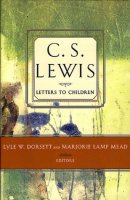 Letters to Children by C. S. Lewis, edited by Lyle W. Dorsett and Marjorie Lamp Mead (Touchstone, 1985)
Letters to Children by C. S. Lewis, edited by Lyle W. Dorsett and Marjorie Lamp Mead (Touchstone, 1985)
For a man whose primary experience with children was that he had once been one himself, C. S. Lewis does a remarkable job of writing to them with the respect due to their intelligence and wisdom. He talks down to them only a very little—and frankly, from the heights of his intellect, there's no other way to talk with almost anyone, of any age, but down. This collection of letters, written mostly to admirers of his Narnia books, on both sides of the Atlantic, contains both information and wisdom I've not seen elsewhere in his writings.
My first quotation is from the rather long introductory material, and sheds light on some of the restrictions imposed on children in olden times. We shake our heads, but we who live in the age of vaccines and antibiotics have no right to laugh.
[The lives of Jack Lewis and his brother Warren] were remarkably like the lives of children today—with one major exception: when it rained, which it did often in Belfast, the Lewis brothers were not allowed outside. This rain-time restriction was the result of the danger of tuberculosis, a disease dreadfully more serious in the early 1900s than it is now. Keeping children warm and dry was a parent's best defense against the threat. (pp. 10-11)
Where I grew up the great thing was Halloween.... There was always a slightly eerie, spooky feeling mixed with games, events, and various kinds of fortune telling—not a good night on which to walk through a churchyard. (Tho' in fact Irish people, believing in both, are much more afraid of fairies than of ghosts.) (p. 37)
This astonished me, and makes me feel better about what I had thought was an inconsistency in the Harry Potter books. I had never been able to figure out why Hallowe'en figures so prominently in them, while Guy Fawkes's Day is neglected. I was relying on a friend from Heather's first grade days, who had recently moved here from England, and couldn't understand "this strange American holiday, Hallowe'en." I know now that, at least in some parts of the United Kingdom, the holiday was well established long before J. K. Rowling was born.
I've never seen Aida, but I've known the music since I was a small boy: and how good it is. It's rather the fashion over here now amongst the musical snobs to look down their noses when Verdi is mentioned and talk about the "cheapness of his thematic material." What they really mean is that Verdi could write tunes and they can't! (p. 48)
The [Narnia] books don't tell us what happened to Susan. She is left alive in this world at the end, having by then turned into a rather silly, conceited young woman. But there is plenty of time for her to mend, and perhaps she will get to Aslan's country in the end—in her own way. (p. 67)
I think I agree with your order for reading the [Narnia] books [chronologically] more than with your mother's [in publication order]. (p. 68)
I've said it before: Lewis may be the author, but I think he's wrong. It's much more powerful to read The Magician's Nephew after The Lion, the Witch, and the Wardrobe, looking backwards and discovering, for example, the origin of the Wardrobe and the Lamp Post.
Provided the thing is in itself right, the more one likes it and the less one has to "try to be good," the better. A perfect man would never act from sense of duty; he'd always want the right thing more than the wrong one. Duty is only a substitute for love (of God and of other people), like a crutch, which is a substitute for a leg. Most of us need the crutch at times; but of course it's idiotic to use the crutch when our own legs (our own loves, tastes, habits etc.) can do the journey on their own! (p. 72)
The following is for all my teacher friends, especially the university math professor who knows how true this is!
Beware of the [mathematics] master who over-marks the work. Generous marking is nice for the moment, but it can lead to disappointments when, later, one comes up against the real thing. American university teachers have told me that most of their freshmen come from schools where the standard was far too low and therefore think themselves far better than they really are. This means that they lose heart (and their tempers too) when told, as they have to be told, their real level. (pp. 83-84, emphasis mine)
What a drole idea in Florida, to give credits not for what you know but for hours spent in a classroom! Rather like judging the condition of an animal not by its weight or shape but by the amount of food that had been offered it! (p. 88, emphasis mine)
I was at three schools (all boarding schools) of which two were very horrid. I never hated anything so much, not even the front line trenches in World war I. Indeed the story is far too horrid to tell anyone of your age. (p. 102)
And on that depressing note I'll close. Letters to Children is not one of Lewis's most freqeuntly read books, but it is well worth the effort if you can find a copy.
With respect to keeping children inside to avoid tuberculosis, note that I originally wrote this review in February, before today's generations had their own chance to experience staying inside to avoid disease. Back then the idea seemed to belong to the distant past.


